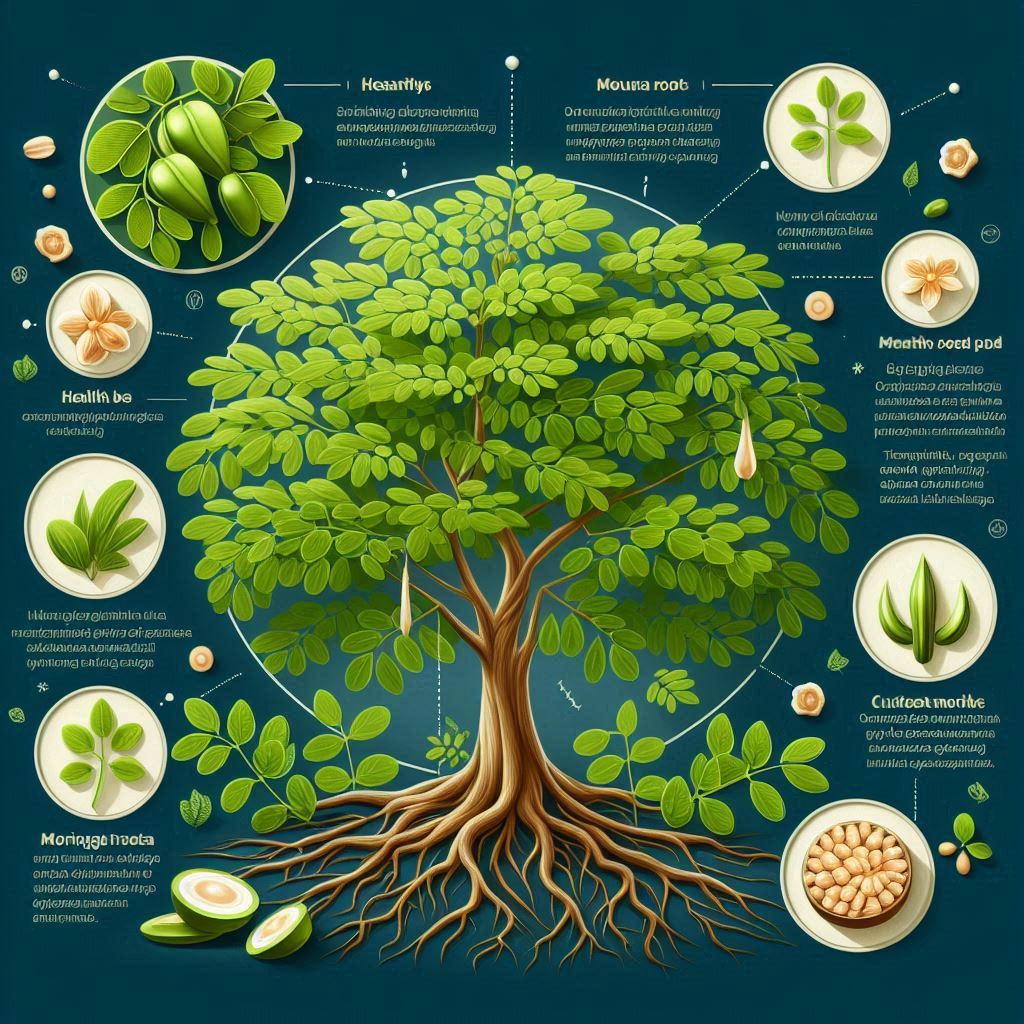Moringa: The Miracle Tree for Health, Sustainability, and Business Growth
Often hailed as the “miracle tree,” Moringa (specifically Moringa oleifera) has intrigued health enthusiasts, gardeners, and entrepreneurs alike. Its versatility, be it as a nutritional powerhouse or a resilient, low-maintenance plant, marks it as one of nature’s most valuable gifts. In this article, we explore the multifaceted benefits of Moringa, provide practical advice for growing and maintaining the plant, and delve into the emerging business prospects that make it an investment worth considering.
The Nutritional Marvel: Health Benefits of Moringa
Moringa stands out because of its incredible nutrient density. Every part of the tree—from its leaves to its seed pods—boasts vital vitamins, minerals, and antioxidants that contribute to overall wellness. Some of the key health benefits include:
- Rich in Vitamins and Minerals: Moringa leaves are abundant in vitamins A, C, and E, which are essential for maintaining a healthy immune system, supporting eye health, and promoting youthful skin. They also provide vital nutrients like calcium, potassium, and iron that help sustain strong bones and proper bodily functions.
- Antioxidant Powerhouse: The tree is loaded with antioxidants such as quercetin and chlorogenic acid. These molecules help combat oxidative stress, reducing inflammation and the risk of chronic diseases such as heart disease and diabetes.
- Anti-inflammatory Properties: Chronic inflammation is a common denominator in many ailments. Moringa’s naturally occurring compounds can help reduce inflammation, potentially easing conditions like arthritis and supporting overall joint health.
- Regulation of Blood Sugar and Cholesterol: Preliminary studies suggest that Moringa may play a role in lowering blood sugar levels and managing cholesterol, contributing to cardiovascular health and reducing the risk of metabolic disorders.
- Digestive Aid: Rich in fiber and with natural antimicrobial properties, Moringa supports healthy digestion and may help alleviate constipation and digestive discomfort.
These benefits have been recognized in traditional medicine for centuries, and modern research continues to explore the full potential of Moringa as a natural supplement for promoting wellbeing.
Cultivating Moringa: How to Grow and Maintain This Resilient Plant
One of Moringa’s most appealing features is its ability to thrive in a wide range of conditions, making it an ideal plant for both home gardeners and commercial agriculture.
Ideal Growing Conditions
- Climate Adaptability: Moringa is a tropical to subtropical tree that flourishes in warm climates. It thrives in temperatures above 77°F (25°C) and is highly drought-tolerant, making it suitable for regions with irregular rainfall.
- Soil Requirements: While it prefers well-draining, sandy loam soil, Moringa is not overly fussy. It can adapt to a variety of soil types, though incorporating organic matter can boost its growth.
- Sunlight: This plant requires full sun exposure to maximize its growth potential. Ensure it receives at least 6 hours of direct sunlight daily.
Planting and Maintenance Tips
- Planting: Start with seeds or small saplings. Seeds can be sown directly into spacious, well-draining pots or prepared garden beds. If using saplings, transplant them carefully to avoid disturbing the roots.
- Watering: Though Moringa is drought-resistant, young plants need regular watering until they are well-established. Once mature, watering frequency can be significantly reduced.
- Pruning: Regular pruning encourages bushier growth and enhances leaf production. Removing damaged or overcrowded branches improves air circulation and directs energy toward new, nutrient-rich foliage.
- Fertilization: While Moringa generally thrives without heavy fertilizer inputs, the addition of organic compost or a balanced organic fertilizer can help in the early stages of growth.
By following these practices, gardeners can enjoy a steady supply of fresh Moringa leaves, and commercial growers can achieve efficient, large-scale production with minimal inputs.
Uncovering Business Potential: Moringa in a Growing Market
The global shift towards natural health and organic products has positioned Moringa as a key ingredient in various industries, opening up exciting commercial opportunities.
Market Trends and Opportunities
- Nutritional Supplements: With consumers increasingly seeking organic health supplements, products like Moringa powder and capsules are in high demand. Health enthusiasts are eager to integrate its nutrient-rich profile into their diets, driving both local and international sales.
- Cosmetics and Skincare: The antioxidants and vitamins in Moringa make it a popular ingredient in natural beauty products. From creams to hair serums, natural formulations featuring Moringa offer a competitive edge in the organic beauty market.
- Food and Beverage Innovation: As culinary trends move toward superfoods, Moringa is being incorporated into smoothies, teas, soups, and energy bars, offering a healthy twist in innovative food creations.
- Agricultural Sustainability: Due to its low water requirements and resilience in nutrient-poor soil, Moringa is a sustainable crop choice. It enables farmers, especially in arid or developing regions, to generate income quickly while contributing to local food security.
Investing in Moringa means tapping into a growing market where health, sustainability, and business profitability intersect.
Integrating Moringa into Daily Life: Culinary and Practical Uses
Moringa’s versatility extends beyond health supplements and business prospects—it can easily be incorporated into daily living:
- Culinary Uses: Fresh Moringa leaves can be added to salads, soups, and stews, or blended into pesto and smoothies for a nutritional boost. Experimenting with Moringa-infused recipes is a creative way to enjoy its slightly earthy flavor.
- Beverages: Moringa tea, made from steeping its dried leaves, offers a refreshing, antioxidant-rich drink.
- Home Remedies: Traditional cultures have long used Moringa for natural healing. Moringa oil, extracted from its seeds, serves as a nourishing addition to skincare routines, protecting and revitalizing the skin.
Its widespread uses ensure that Moringa isn’t just limited to supplement bottles—it becomes a part of everyday wellness and culinary innovation.
Championing Sustainability and Socioeconomic Impact
Moringa not only supports individual health and business growth but also plays a pivotal role in sustainable agriculture and community development.
- Eco-friendly Cultivation: With its ability to thrive in arid conditions and require minimal chemical inputs, Moringa is an environmentally sustainable crop. This makes it a champion for eco-friendly farming practices.
- Socioeconomic Benefits: In rural and developing areas, Moringa cultivation can offer a reliable source of income, helping small-scale farmers improve local food security and achieve economic stability.
- Community Health: As communities incorporate Moringa into their daily diets, broader public health benefits may emerge, potentially reducing healthcare costs and improving overall quality of life in regions prone to nutritional deficiencies.
When embraced on a larger scale, Moringa helps create a sustainable cycle where health, ecological balance, and economic empowerment reinforce one another.
Conclusion
Moringa truly lives up to its reputation as a miracle tree. With a breathtaking nutritional profile, ease of cultivation, and multiple applications, it stands as a versatile asset for health enthusiasts, gardeners, and entrepreneurs alike. Whether you’re looking to boost your nutrition, cultivate a resilient crop, or invest in a booming market, Moringa offers a compelling pathway to a healthier, more sustainable future.
As global interest in natural, sustainable, and health-oriented products continues to rise, Moringa is poised to play a significant role in diets, economies, and environmental efforts around the world. Embrace the potential of this extraordinary tree and discover a multifunctional resource that nurtures the body, supports eco-friendly practices, and opens doors to promising business ventures.
Further Explorations:
Consider diving deeper into innovative Moringa-based product case studies, modern farming techniques such as drip irrigation, and emerging research on its anti-inflammatory properties. The world of Moringa is vast and full of opportunities waiting to be discovered!



.png)
Join the Conversation